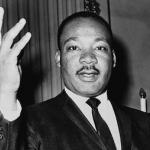What Would Martin Luther King Do?

In March 1968, President Lyndon Johnson—who had successfully launched important voting rights and anti-poverty initiatives—under pressure from the military decided to send additional troops to join the more than half a million already in Vietnam. There they would fight and eventually lose a war that cost the United States $100 billion. That same month, the bipartisan Kerner Commission, appointed by Johnson in 1967 in response to riots in dozens of American cities, concluded that a massive national investment, estimated at $80 billion to $100 billion in employment, education, welfare and housing, was essential to prevent our nation from becoming “two societies, one black and one white—separate and unequal.” The commission briefly considered recommending reducing and reallocating resources from the war in Vietnam but decided that would be too controversial.
Fearing the political costs of losing the war in Vietnam and facing deepening racial division and white backlash at home, Johnson ignored the Kerner Commission report and, in a televised address to the nation on March 31, announced he would not seek a second term as president. Five days later, on April 4, Martin Luther King Jr., who had praised the Kerner report, was assassinated in Memphis, Tenn., where he had gone to support the struggle of striking sanitation workers.
A year earlier, in his famous Riverside Church sermon, “A Time to Break Silence,” which he delivered on April 4, 1967, King carefully—yet controversially—explained why he opposed the Vietnam War, in part because of U.S. support for France keeping Vietnam as a colony. He spoke about the triple threats of racism, poverty and militarism. Reflecting his view that the war threatened Johnson’s “Great Society” initiatives, King declared, “There was hope for the poor—both black and white—through the poverty program, then came the buildup in Vietnam.”
Had he lived, there is little doubt that King would have opposed the U.S. wars in Afghanistan and Iraq, not only based on his principled commitment to nonviolence and against war, but because, like the Vietnam War, these wars have robbed our nation of essential human and economic resources, estimated so far at more than $4 trillion—resources as desperately needed today as they were 50 years ago to address problems of poverty, racism and growing inequality.
On the 50th anniversary of the Kerner Commission report, several publications reported on some progress over the past five decades but also catalogued conditions that have remained the same or gotten worse. Among the most revealing and troubling indicators is that, while the overall percentage of Americans living in poverty has remained about the same since 1968, the percentage of American children living in poverty and the percentage of people living in “deep poverty” (on incomes less than half the poverty level) have both increased. Shockingly, the United States has one of the highest rates of child poverty of any developed country. While percentages of black and Hispanic children in poverty are higher than those of whites, one-third of all American children living in poverty are white.
Fred Harris, the sole surviving member of the Kerner Commission, and Alan Curtis, president and CEO of the Eisenhower Foundation, have edited a new book, “Healing Our Divided Society,” an updated review of the challenges our country faces and what can be done. The book includes two dozen articles by prominent economists, educators, journalists, sociologists and others, with recommendations for major national investments in economic development, employment, education, health care, housing and neighborhoods. It includes critical articles addressing crime prevention, criminal justice policy and the need for effective messaging to engage the media, something the Kerner Commission failed to do 50 years ago.
Ron Young is an activist and author living in Everett, Wash. Ron marched with Martin Luther King Jr. in Selma, Ala., for voting rights and in Washington, D.C. against the Vietnam War.
